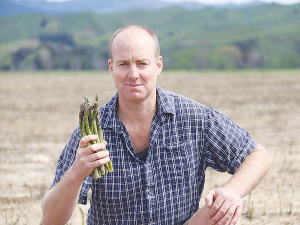First ever biofuel kiwifruit charter completed
Fresh Carriers Co. Ltd (FCC) and Zespri have completed the first ever kiwifruit charter powered by a low-emissions fuel.
 Asparagus council chair Sam Rainey says the spiraling cost of air freight means it is unlikely that any NZ-grown asparagus will be exported this season.
Asparagus council chair Sam Rainey says the spiraling cost of air freight means it is unlikely that any NZ-grown asparagus will be exported this season.
It's unlikely any NZ-grown asparagus will be exported this season.
That's the word from the chair of the asparagus council, Sam Rainey, who says the spiraling cost of air freight has made this impossible.
Traditionally, NZ asparagus is exported to Japan, Singapore and some of the Pacific nations. However, Rainey told Rural News that huge freight rate rises - due to the Covid pandemic - mean it is no longer profitable to send the highly desirable vegetable overseas.
"The reality is that exporting was barely profitable before Covid and the fact that it is not now makes it really challenging for the industry, which has to rely entirely on the domestic market."
Rainey says the issue with asparagus is that its production season is short - October through to December - and it's not easy to spread the growth of the crop. In warm weather, asparagus grows quickly and needs to be harvested immediately, and there is a risk of a glut of it on the market. This is despite the fact that the industry has shrunk significantly over the years.
"As growers we all understand the market and the nature of the crop, so no one wants that oversupply," he explains.
"The supermarkets and growers want a nice, consistent fresh supply. Remember asparagus is highly perishable and you want to be eating it fresh. As an industry, we need to manage that."
With the industry now confined to the domestic market, the challenge is to get more people to eat asparagus, Rainey says the industry has invested heavily in promotional activities in an effort to increas asparagus consumption and he is confident that they can do this.
"But what blows me away is that so many young people don't eat asparagus and we need to manage that as an industry," he adds.
"It's about getting people to open their eyes to asparagus because it's nutritious, versatile and really good for you and you can add it to any dish."
Coming in at a year-end total at 3088 units, a rise of around 10% over the 2806 total for 2024, the signs are that the New Zealand farm machinery industry is turning the corner after a difficult couple of years.
New Zealand's animal health industry has a new tool addressing a long-standing sustainability issue.
The Government has announced that ACC will be a sponsor of this year's FMG Young Farmer of the Year competition.
As veterinary student numbers grow to help address New Zealand's national workforce shortge, Massey University's School of Veterinary Science is inviting more veterinary practices to partner in training the next generation of vets.
South Island dairy farmers will soon be able to supply organic milk to Fonterra.
Norwood has announced the opening of a new Tasman dealership at Richmond near Nelson next month.